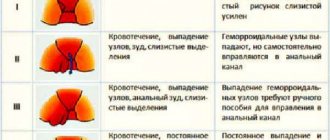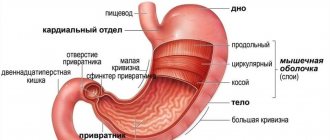Many people are familiar firsthand with such a nuisance as air in the stomach. This is a fairly common pathology. Very few people, unfortunately, pay attention to this problem. This physiological process in medical practice refers to functional disorders of the gastrointestinal system and is called “aerophagy” in scientific terminology. Aerophagia is manifested by uncomfortable sensations in the upper gastric sections, unpleasant fullness of the digestive organ.
The mechanism of development of the pathology is as follows: due to excessive swallowing of air or increased gas formation in the stomach, intragastric pressure increases, which causes the muscles of the organ to simultaneously contract. In this case, the cardiac sphincter relaxes, but the pylorus contracts.
Characteristic symptoms of air in the stomach are bad breath and belching. Swallowing too much oxygen or excessive gas formation in the stomach can cause a lot of inconvenience to a person, but ignoring the problem can lead to the most unpleasant consequences.
Causes of pathology
Let's take a closer look at the causes of air in the stomach. Ingesting it when eating is a fairly characteristic sign that plays a positive role for the proper functioning of the digestive tract. Thanks to the air, favorable pressure in the stomach is ensured. But some people may take in excess air with their food, more than is necessary to maintain gastric health. In such a situation, the pressure inside the stomach of a child or adult rises, causing a whole range of different ailments. For example, excess air volume can cause bloating or flatulence.
Why air collects in the stomach is of interest to many.
It is necessary to mention the presence of belching. The human body, which has accumulated air, can eventually release it through the mouth. Air leaving the stomach through the mouth is characteristic of any person, but healthy people do not pay attention to this process, since it does not have any obvious features. The presence of belching indicates that the body is experiencing pathological disturbances during this period.
There are two types of belching:
- One-time - observed after eating a specific dish that causes unpleasant consequences. In this case, it is worth paying attention to your diet and excluding from it foods that contribute to the occurrence of belching in humans.
- Constant is the main symptom of the development of aerophagia, since it occurs after almost every meal. If such a pathology appears, you should immediately go to a medical facility, where the necessary treatment will be prescribed and medications will be prescribed. An integral part of therapy is adherence to a strict diet.
The presence of an unpleasant odor from the oral cavity is a symptom of aerophagia, associated primarily with belching, which provokes the appearance of pathology. Pain in the stomach, a feeling of bloating, or the appearance of other uncomfortable sensations call into question the presence of aerophagia.
Frequent or constant burping of air
The article was prepared by a specialist for informational purposes only. We urge you not to self-medicate. When the first symptoms appear, consult a doctor.
Description of the disease
Belching air is an involuntary sudden release of odorless gases from the stomach or esophagus through the mouth.
Normally, each swallowing movement is accompanied by the ingestion of a small amount of air (within 2-3 ml), which is necessary to normalize intragastric pressure. Subsequently, the air quietly escapes through the mouth in small portions.
Noticeable belching of air occurs when excessive penetration of air into the stomach during the absorption of food, and in some cases, outside of this process. This phenomenon may indicate the presence of gastric pneumatosis or aerophagia.
With normal functioning of the stomach, such belching is not accompanied by any unpleasant sensations, since the air coming out of it has neither smell nor taste.
Separately, it is worth paying attention to neurotic aerophagia, which is characterized by swallowing air outside of food consumption. In this case, belching of air can occur both after eating and at any other time, with the exception of sleep. This is already a pathological syndrome that requires the attention of a specialist.
Content:
Causes of belching air
To understand the reasons that contribute to belching, you need to understand how the digestive system works. Food entering the oral cavity passes through the esophagus and enters the stomach. If a person overeats, the air present in the stomach comes out. This is a variant of the norm and only confirms that the organs of the digestive system work harmoniously. Therefore, if after a heavy lunch or dinner a person belches with ordinary, odorless air, this is not a cause for any concern.
Sometimes belching occurs during physical training, when the contents of the stomach quickly move inside its cavity, which provokes the release of air out,
Belching can also occur due to the fact that a person wears too tight trousers or belts. This prevents the stomach from expanding normally. Therefore, the organ independently gets rid of the air inside. Most often, a similar situation is observed in people who are prone to obesity. Normally, after some time after eating, belching stops bothering you.
As a rule, all the reasons described above lead to the fact that belching occurs rarely. However, sometimes she begins to literally chase a person. The reasons for this violation can be very diverse, and understanding them is not always easy.
Pregnant women, especially in the 2nd and 3rd trimester of pregnancy, may suffer from belching. This does not indicate the development of any pathology. Everything is explained by physiological reasons. During pregnancy, the uterus increases in size, begins to put pressure on the diaphragm and pushes the air in the stomach out.
Frequent, causeless belching that occurs on an empty stomach is a cause for concern. If the air coming out of the stomach has an unpleasant smell, such as rotten eggs, or a sour or bitter taste appears in the mouth, then this becomes a serious cause for concern. Such belching most often indicates diseases of the digestive system.
However, do not panic ahead of time. A comprehensive examination is necessary, since belching, accompanied by the unpleasant symptoms described above, may indicate improper intake of foods. The term aerophagia is not familiar to everyone. It involves swallowing large amounts of air while eating. This can happen when a person eats very quickly, does not chew food, or eats “on the go.” Also, talking while eating, frequent use of chewing gum, wearing dentures that are inappropriate in size or structure, smoking, inhalations carried out for medicinal purposes, and too deep breathing can lead to the entry of large amounts of air into the stomach. All these reasons can lead to belching that is not associated with food intake. Air will enter from the stomach simply because there is too much of it there.
There are foods and drinks that can cause excess air to enter the stomach. This is especially true for soda. It contains carbon dioxide in dissolved form. After it enters the stomach, this gas accumulates there and tries to come out naturally.
The following can also be considered belching provoking foods:
- Fatty dishes.
- Garlic and onion.
- Legumes.
- Strong brewed coffee and tea.
To get rid of belching caused by the “wrong” foods, you just need to eliminate them from your diet.
You need to be concerned about your own health when belching occurs frequently and is accompanied by the following symptoms:
- Feeling of heaviness in the stomach area.
- Nausea.
- Heartburn.
- Pain in the upper abdomen.
Such belching can be a signal of various diseases affecting the organs of the digestive system, for example:
- Gastritis.
- Peptic ulcer disease.
- Inflammation of the pancreas.
- Gastroduodenitis and duodenitis.
- Inflammatory phenomena in the esophagus.
- Esophageal hernia.
- Weak sphincter between the esophagus and stomach.
- Traumatic injuries to the mucous membrane of the digestive system.
- Gastroesophageal reflux.
- Cancerous lesions of the digestive system.
Belching air after eating
With normal functioning of the human gastrointestinal tract, belching of air after eating appears irregularly and rarely. This phenomenon may occur due to excessive swallowing of air during food consumption.
This happens if:
- eat food too quickly;
- have trouble chewing food;
- eat on the go.
Belching after eating also appears:
- when drinking gas-containing drinks, very hot or cold food;
- due to the habit of talking while eating;
- under stress.
As a result, the swallowed air forms a large air bubble, which puts pressure on the walls of the stomach. Our body, as a balanced mechanism, must take measures to lower blood pressure. And it does this by opening the cardiac sphincter between the stomach and esophagus. Excess air from the stomach enters the esophagus, then into the oral cavity, then belching occurs.
Constant belching of air
Repeated belching of air can occur as a result of systematic violation of the rules of food intake, but in some cases, it can also be considered as a pathological symptom indicating the development of neurotic aerophagia.
Causes of the disease:
- difficulty breathing through the nose;
- diseases of the oral cavity and teeth;
- frequent swallowing of saliva due to excessive salivation.
Frequent swallowing of air not during food intake is characteristic of a pathological conditioned reflex (neurosis).
In addition, aerophagia can develop with:
- chronic gastritis;
- disorder of gastric tone and motility;
- pyloroduodenal stenosis;
- peptic ulcer disease (especially in the case of a high location of the ulcerative lesion);
- cardiovascular failure;
- cardiospasm;
- narrowing of the esophagus;
- aneurysm of the descending aorta.
The clinical picture is as follows:
- There is a constant loud, sometimes “multi-story”, belching of air, and in people suffering from hysteria, it can be accompanied by a loud scream.
- Belching occurs after eating, and at any other time, and sometimes it occurs almost constantly and disappears during sleep.
- Complaints of sensations of fullness and heaviness, which are most often localized in the epigastric region.
Abdominal bloating is observed, in severe cases quite significant, reminiscent of the picture characteristic of intestinal obstruction.
- People with coronary heart disease may experience pain in the heart area with attacks of angina.
- Less commonly, difficulty breathing occurs, including attacks of suffocation.
Experts note that often a typical belching of air is observed in the patient immediately upon examination, which disappears if his attention is diverted. The doctor may observe the patient preparing to swallow air. He pulls his head forward, his chin presses to his chest, then he begins to swallow. With aerophagia, there is bloating in the upper half of the abdomen. And the x-ray determines the high position of the diaphragm, especially its left dome due to the enlarged air bubble of the stomach and a large accumulation of gases in the intestines.
Newborns and infants can suffer from aerophagia. In some cases, the child’s nervous system cannot cope with the regulation of the digestive apparatus. The disease can also develop due to sucking on a small breast or an empty nipple, which increases the amount of air swallowed.
The main signs of aerophagia in children:
- crying while eating;
- rapid bloating;
- refusal of food and, as a result, weight loss.
When changing position or on their own, the baby may burp air, then calm down and start sucking again. The diagnosis can be confirmed by X-ray examination. Some children get used to swallowing air; you can wean your child off this habit by strictly regulating food intake. Aerophagia in children is associated, for the most part, with general neuropathy or imperfect nervous regulation of the digestive organs, and it goes away with age.
Stomach pain and belching of air
Painful sensations in the stomach with belching of air may indicate a disease, be its harbingers or the consequences of improper nutrition.
Similar problems may arise due to:
- Smoking after eating. Most smokers reach for a cigarette after finishing a meal, but according to recent research, one cigarette smoked after a meal is equal to ten. During the smoking process, air and smoke are swallowed, which leads to belching with stomach pain.
- Eating fruits. Many people prefer to eat fruit for dessert - this is wrong. Fruits should be eaten before or after meals 1-2 hours before. Otherwise, the organic acids contained in fruits interact with minerals that are present in other products and affect the process of digestion and absorption of food.
- Tea party. You should not drink tea after meals, as the enzymes contained in tea leaves “weight” the proteins in food, preventing normal digestion.
- Taking a bath. This procedure, pleasant and beneficial for the body and soul, should not be performed after a meal, since the increase in blood flow in the extremities correspondingly reduces the blood flow in the stomach area, weakening the digestive system and causing pain in the stomach and belching.
- Loose belt. The habit of unfastening your belt after eating has a negative impact on bowel function and can cause severe pain with belching.
- Cold drinks. Drinking cold liquids immediately after meals interferes with normal stomach fermentation and lipid absorption.
- Sleep after eating. Many people “sin” with the weakness of taking a nap “after a delicious lunch” when there is such an opportunity. But in a dream, proper digestion is simply impossible. As a result, you can get the above symptoms, which can become harbingers of gastroenterocolitis.
Note that the range of diseases that are characterized by pain in the abdominal area and empty belching is quite wide. Therefore, you should not delay solving this problem and seek advice from a gastroenterologist.
How to get rid of air burps?
First of all, with such an illness, a person thinks about the state of his health, but the aesthetic side of the problem also plays an important role. Therefore, when a person begins to regularly burp involuntarily, he is forced to look for ways that will save him from repetitions of such embarrassment.
Treatment methods for belching depend on the causes of its occurrence.
If we are talking about symptomatic aerophagia, then the main attention is paid to the disease that provoked its development.
For aerophagia, which is neurotic in nature, psychotherapy plays a major role:
- You need to understand the essence of the disease and do everything possible to mobilize all your will to suppress the conditioned reflex. This is not an easy task, since swallowing air usually occurs involuntarily and unnoticed by a person, and here close people can help him. The fact is that a person automatically causes a belch by swallowing air and believing that it will help get rid of the uncomfortable feeling of bloating. It is on this attempt that his attention should be focused. The disappearance of belching will disrupt the entire pathological conditioned reflex and lead to its complete extinction.
- In case of increased salivation, it is recommended not to swallow, but to spit out the saliva.
- Food must be taken slowly, excluding conversations.
- It is necessary to follow a diet that excludes foods that linger in the stomach for a long time.
- It is better to eat often, but in small portions.
- In severe cases, separate intake of liquid and solid foods may be required.
- Physical education and breathing exercises are advisable.
- It is necessary to calm and strengthen the nervous system.
If the cause of burping air lies in poor nutrition, then you will have to radically change this approach and begin to follow the following simple rules:
- Try to stop talking while eating. The habit of talking and eating at the same time is inevitably accompanied by swallowing excess air and, as a result, leads to belching of air.
- Chew food thoroughly with your mouth closed, which is known to improve digestion and also reduce the formation of gases in the stomach.
- If you smoke, try not to swallow air or smoke.
- Reduce intake of foods that cause belching:
- drinks containing carbon dioxide and beer;
- Luke.
- milk, as well as ice cream;
- Do not drink drinks through a straw; air enters the stomach along with the liquid. Do not eat while in a state of nervous excitement. Try to distract yourself, calm down, perhaps take a short walk before eating.
- Do not abuse chewing gum. The normal rhythm of the stomach may be disrupted due to excessive chewing movements. Try to consume more foods rich in microelements and vitamins.
- Avoid excessive exercise after meals. The human body requires rest for 2-3 hours for normal digestion of food. Heavy physical labor and sports activities after eating lead to disruption of the natural motility of the gastrointestinal tract, which provokes belching.
- Avoid whipped “airy” drinks, such as a milkshake; they contain air bubbles, which also go into the stomach. Sometimes the cause of belching is hidden in some product; it must be identified and excluded from the diet.
- After eating, many people like to lie down, but this should not be done, it is better to take a short walk. Don't overeat. Remember that the human body is capable of digesting any amount of food (within reasonable limits, of course) until the age of forty on average. Afterwards, the enzymatic functions of the body gradually decrease, and excessive gluttony can lead to various problems, from excess weight to the appearance of involuntary regurgitation. Do not drink hot drinks, as air is drawn in at the same time as the hot liquid.
Author of the article:
Gorshenina Elena Ivanovna |
Gastroenterologist Education: Diploma in General Medicine received from the Russian State Medical University named after. N. I. Pirogova (2005). Postgraduate course in the specialty "Gastroenterology" - educational and scientific medical ]Our authors[/anchor]
Types of aerophagia
Like most other diseases, aerophagia does not have precisely established causes of the pathology. That is why a classification has been developed in medicine, covering different reasons for the appearance of air in the stomach.
Currently there are three types of pathology:
- Aerophagia is neurological, which, as its name suggests, occurs due to prolonged nervous disorders and nervous breakdowns. It must be said that the neurological type of the disease is widespread in the world.
- Traditional aerophagia occurs as a consequence of other diseases, for example, ulcers, gastritis. The causes may also be pathologies of the oral cavity, respiratory tract, heart and other inflammatory processes.
- Causal aerophagia occurs sporadically. It can be caused by various bad habits, accompanied by swallowing large quantities of saliva or air.
What causes air in the stomach after eating?
Nutrition
Very often, an incorrect diet becomes the cause of the emergence and development of a wide range of pathologies, and not only of the digestive tract. The most common foods that cause the sensation of air in the stomach in excess quantities have been identified by experts. These include:
- carbonated soft drinks;
- rolls and bread;
- champagne;
- fruits;
- cabbage;
- legumes;
- chewing gum.
All of these products produce gases when they enter the stomach. This is why excessive consumption of such foods and drinks can cause air in the stomach.
Preventing gas in the stomach
Preventing the accumulation of gas in the stomach depends on the cause. For pathological causes, such as infectious gastritis, treatment is necessary. As for other more common causes of stomach gas related to swallowing air and carbonated drinks, avoiding the causative factors will prevent or at least significantly reduce stomach gas .
Tips to prevent stomach gas
- Eat slowly, chew thoroughly, and swallow thoroughly chewed food.
- Avoid carbonated drinks such as soda, bottled soda, beer and sparkling wine.
- Do not chew gum repeatedly throughout the day.
- Do not use high doses of antacids, especially for long periods. Always seek medical attention for persistent stomach conditions rather than self-medication.
- Consult an otolaryngologist (ENT) regarding persistent nasal congestion.
There are still questions: Consultation with a gastroenterologist online.
Persistent gas in the stomach should be investigated by a doctor, especially if it is associated with abdominal pain, bloating, loss of appetite, and unintentional weight loss.
Other causes of pathology
There is a whole list of other reasons, which are a kind of habits that provoke increased gas formation in the human body. For example, smoking after eating has a negative effect on the stomach in the following ways. The first thing you swallow when smoking is extra air. In addition, nicotine has a negative effect on the stomach, which causes belching and pain.
The process of eating food and its absorption in the body must be treated very carefully, since trouble can await any person even when there are no prerequisites. Taking a bath immediately after eating increases blood flow in the extremities due to a decrease in current in the gastric region. Those who like to sleep immediately after eating should also be on guard, since the body slows down the digestive process during sleep, ultimately causing discomfort.
There are several other causes of pathology:
- talking while eating;
- fast eating;
- eating too much;
- playing sports after eating;
- second trimester of pregnancy.
Due to all of the above reasons, excess air enters the human stomach, so you need to be responsible and attentive to the process of eating and refrain from certain types of activities immediately after eating.
Causes
Gases in the stomach of a healthy adult are normal. Their volume, quantity and composition are determined by the age category, lifestyle and nutritional characteristics of the individual. The body tends to produce from 0.5 to 1.5 liters of gases daily. Most of them exit through the anus, but in some people some of the gases do not leave the stomach wall, coming out in the form of belching. There are several reasons for this:
- consumption of carbonated soft drinks, sparkling wines;
- passion for foods that increase gas formation - bread, fresh baked goods, legumes, cabbage, etc.
- binge eating;
- hasty eating;
- active physical activity immediately after eating;
- swallowing large amounts of air in stressful situations;
- emotional communication;
- frequent mouth breathing when smoking, problems with the nasal cavity or chewing gum;
- second and third trimesters of pregnancy - increased intraperitoneal pressure due to the growing uterus, causing a rise in the dome of the diaphragm;
- decreased tone of the cardinal sphincter in the postoperative period.
Diet is often the cause of gas formation in the stomach.
Gases as a symptom of disease
Excessive air in the stomach after eating may indicate the presence of certain diseases in the body.
This phenomenon is often observed with inflammation of the mucous membrane of the organ, which develops against the background of the following health problems:
- peptic ulcer;
- functioning of the bacterium Helicobacter Pilori, that is, gastritis;
- hiatal hernia;
- Zenker's diverticulum;
- reflux esophagitis;
- scleroderma of the esophagus;
- achalasia cardia;
- pyloric stenosis;
- diseases of the cardiovascular system (angina pectoris, myocardial infarction, etc.);
- pathologies of the gallbladder and liver (pancreatitis, cholecystitis, cirrhosis, etc.).
There is also neurotic aerophagia, in which the patient voluntarily swallows a large amount of air, regardless of physical activity, bad habits or food intake. Its symptoms intensify with stress and emotional tension.
Air in the stomach and a lump in the throat often accompany each other.
I can’t burp, what should I do, how can I cause a burp?
With normal functioning of the organs and proper nutrition, belching is empty and occurs rarely. Gases are produced when food is broken down, and air is swallowed at the same time as food. Therefore, belching appears precisely after a meal.
If you experience flatulence, bloating and other negative symptoms, and gases and excess air do not leave the body, you can alleviate the condition by artificially inducing belching.
It is caused by certain foods. If a person cannot burp air from the stomach, you can drink any carbonated drink. This needs to be done in one gulp, quickly. It is recommended to drink at least half a glass, or better yet, a whole glass.
Products
You need to drink soda very quickly, this will contribute to additional swallowing of air, which is why belching will appear.
Drink a carbonated drink. As you know, such drinks contain a huge amount of carbon dioxide, which, when it enters the stomach, causes a strong artificial belch. There are several rules that will help air escape when drinking soda:
- you need to drink soda very quickly, this will contribute to additional swallowing of air, which is why belching will appear;
- try to drink a drink from a glass in a half-bent position, take a small sip, you need to straighten up and swallow, after a while the excess air escapes.
However, this method has contraindications for impaired gastric motility. Otherwise, the unpleasant symptoms will only intensify. For belching to appear in your diet, it is advisable to include as much as possible:
- pears;
- legumes;
- cucumbers;
- cabbage;
- apples
They contribute to excessive gas formation in the stomach, which will cause belching. Sometimes fiber helps restore gastric motility. Another way is chewing gum or sucking pills. They promote swallowing air and causing belching. It is also caused by fruit jelly.
Change position
If after eating a person likes to lie down or sit in an uncomfortable position, then you need to try to change your position: stand up, jump, and do other exercises. Lying on your stomach will help the gases go away, while you should try to make movements to the sides, as if performing a massage.
Take antacids
These are drugs that regulate the level of acidity in the stomach and taking them will help activate artificial belching.
These are drugs that regulate the level of acidity in the stomach and taking them will help activate artificial belching. However, despite the wide range of uses of antacids, some of them have side effects and uncontrolled use can worsen symptoms.
Trigger gag reflex
Many people find this method unpleasant, but sometimes it turns out to be effective and helps induce belching. To do this, place your finger on the upper palate and apply light pressure. This will cause reflex contractions in the abdomen and diaphragm, causing excess gas to escape. However, do not press too hard, because this method can induce vomiting.
suck in air
To do this, you need to part your lips as if in a smile, relax your throat and inhale air through your mouth. To inhale correctly, you must always keep your tongue pressed to the upper palate. You need to swallow air carefully, as an incorrect movement can lead to painful sensations in the sternum. When exhaling, you need to watch how the air gradually flows through the throat.
Swallow air
If inhaling with a closed throat does not bring any effect, then you can try to reproduce it, but do not exhale the air, but swallow it. To do this, you need to exhale as much as possible, then inhale as much as possible and swallow all the air. Excess air will put additional pressure on the abdominal walls, resulting in an artificial burp.
Symptoms
It is necessary to pay attention to the signs that occur with a pathology such as aerophagia. If one of the symptoms listed below appears, it is recommended to visit a gastroenterologist. Characteristic signs of air in the stomach are:
- feeling of bloating;
- constant belching, lump in throat after every meal;
- tingling in the heart area;
- feeling of oxygen deficiency during breathing;
- flatulence;
- rumbling in the stomach, accompanied by a lack of peace and discomfort;
- stomach pains of various types.
In order not to be exposed to an unpleasant pathology, it is necessary to pay attention to existing preventive measures. Naturally, for a healthy person, constant dietary restrictions are not the most pleasant option, given how much delicious food exists in the world. Therefore, you need to abstain from undesirable foods and get rid of bad habits, if possible, while simultaneously instilling useful ones in yourself.
How to get rid of pain and air in the stomach?
Stomach diseases
The cause of constant air ulceration is dysfunction of the cardia and other pathologies.
Gastritis
In acute and chronic cases, it is accompanied by belching with dull pain, heaviness, distension, and vomiting. With the onset of tissue atrophy, the belching becomes rotten, and the patient loses appetite. Vitamin B12 and iron deficiency develops. Pallor, weakness, and brittle nails and hair appear. If gastritis is caused by Helicobacter, belching comes with heartburn and morning hunger pains.
Ulcers
Accompanied by sour belching due to destruction of the mucous membrane, as well as:
- sharp or dull pain after meals, at night, in the morning;
- decreased appetite;
- constipation;
- nausea with relieving vomiting, while the vomit contains residues of food and bile.
Changes in the evacuation section of the stomach
Spasm of the teres muscle and luminal stenosis occurs. Excessive pressure is created inside the organ and stagnation of the contents. The result is air with a rancid odor and sour taste. The causes of the disease are varied:
- burns;
- scarring of ulcers;
- tumors.
Without treatment, the pathology quickly progresses, and belching comes out with vomiting.
Cancer
Young malignant tumors cause belching, which is similar to the phenomenon of gastritis. Signs:
- lack of appetite;
- satiety in small portions;
- refusal of meat;
- anemia;
- feeling of heaviness.
Treatment
First of all, the correct therapy for aerophagia is determined by the cause of the occurrence and further development of the pathology. The important point is that if the disease is caused by disorders of the nervous system, treatment should be carried out under medical supervision in accordance with all instructions. In such a situation, self-medication can worsen the patient's condition, negatively affecting his health.
Causal aerophagia can be cured independently at home, since it is episodic in nature and, by and large, is not a disease as such. Those patients who suffer from this type of illness need to carefully plan their diet and not eat foods that cause excessive gas formation and further belching. For a while, it is worth giving up any carbonated drinks altogether, and eliminating chewing gum, which promotes the release of excess saliva.
To eliminate this pathology, you need to avoid physical activity immediately after eating. In addition, it is not advisable to drink water or tea immediately after eating. This also has a negative effect on the body, and therefore it is advisable to wait a while after eating (from half an hour), setting aside a cup of tea for this period of time.
In general, all habits that adversely affect the activity of the gastrointestinal tract, outlined above, should be strived to be eliminated and not forgotten about their negative impact.
After a short time of abstaining from undesirable habits, aerophagia of the cause-and-effect type will no longer bother the patient. The most important thing is not to provoke your body into excessive gas formation in the future.
How else to get rid of air accumulation in the stomach?
Treatment with medications
Naturally, the best option for getting rid of any disease is to contact medical institutions with appropriate specialists. However, you can get rid of aerophagia with the help of drugs that can be bought and taken without a doctor's prescription. Activated carbon or Smecta cope with this task perfectly. It is advisable to take these medications during overeating. In addition, doctors recommend magnesia as an auxiliary therapeutic method.
Simethicone successfully copes with gas formation, affecting the intestinal and gastric walls, reducing the formation of gases and stabilizing the activity of the gastrointestinal tract. To artificially break down non-absorbable carbohydrates found in foods, you can take dietary supplements with enzymes.
The accumulation of gastric air thus becomes an unpleasant pathology, which can develop on the basis of another disease or cause excessive formation of gases in the human body. If you start treatment on time, you can get rid of such a disease with minimal expenditure of financial resources and in a short time. If self-therapy does not give the desired effect, a rational decision would be to visit a doctor who will choose the right course of treatment individually for each patient.
How to get rid of air in the stomach using traditional methods?
Traditional methods
Traditional medicine also has its own methods of combating such pathology in patients. Its adherents recommend drinking onion juice, which improves the functioning of the stomach. For this purpose, you need to squeeze the juice of one large onion, mix it with beet juice in a 1:1 ratio, add a few drops of lemon juice. The resulting composition in a volume of thirty milliliters is diluted in half a glass of warm water and taken three times a day before meals.
The activity of the gastrointestinal tract can be improved by herbal infusions and decoctions. The undoubted leaders are ginger, mint leaves, lemon balm, and fennel. An infusion of eucalyptus leaves (one spoon per five hundred milliliters of boiling water) is quite effective; it should be drunk twice a day. Simple and accessible parsley will save you from air in the stomach: fresh herbs are chopped and poured with boiling water for eight hours, then taken throughout the day as desired.
Possible consequences
A pathology such as the accumulation of air in the stomach or aerophagia is not always as harmless as it might seem. The danger of the disease lies in the fact that the air accumulated in the stomach begins to put pressure on the internal organs located nearby. In turn, this will definitely affect the cardiovascular system. In addition, the combination of aerophagia with other symptoms may indicate the presence and progression of certain diseases.
The worst thing is excessive gas formation during pregnancy. Accumulated gases, causing a feeling of fullness in the stomach, can cause a missed pregnancy or spontaneous miscarriage.
Such cases are rare in medicine, but there is still no need to take risks. In the first trimester, the appearance of pathology is a fairly rare occurrence; in the second and third, it affects every second woman, and it is scary and painful for her. The consequence of negligent attitude towards health is harm to the mature baby. A timely visit to the doctor will help prevent negative consequences.
We looked at such a pathology as excessive accumulation of air in the stomach. Causes and treatment are described.











